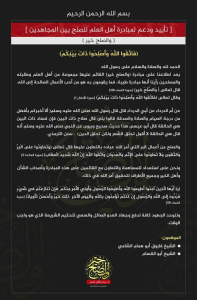Everywhere Abu Musab al-Zarqawi went, Abu al-Qassam was with him. Even to prison. Abu al-Qassam was al-Zarqawi’s childhood friend, later his companion and finally his deputy. After spending more than 10 years in Iranian captivity, he was released in March 2015, but despite the Islamic State claiming to be the heirs of al-Zarqawi, it is now with al-Qaida that Abu al-Qassam’s loyalty lies.
Originally from Ramallah, Abu al-Qassam grew up in Zarqa, just north of Jordan’s capital Amman. It was here, in one of the city’s mosques – most likely al-Hussein bin Ali Mosque – that he one day as a young man met Abu Musab al-Zarqawi, who eventually would become the founder of al-Qaida in Iraq, the Islamic State’s predecessor. The two would go on to become close, even family.
He was born as Khalid Mustafa Khalifa al-Aruri in 1967, but it was as Abu al-Qassam or Abu Ashraf that he eventually became known in Jihadi circles. Little is known about his early years and the information available is conflicting. One story is that he worked for a Saudi organization, the IIRO, in 1991 before returning to Zarqa a year later. Perhaps it was then that he stumbled upon al-Zarqawi, one year his senior and who was back from Afghanistan after his first battlefield experience. Another account is that he in fact joined al-Zarqawi in Afghanistan. In any case, from 1993 the two were inseparable.
Like al-Zarqawi, Abu al-Qassam was imprisoned in Jordan on 29 March 1994 until March 1999 (another account is that Abu al-Qassam was released early as there was not enough evidence against him) in the ‘Bay‘at al-Imam’ case, referring to the group al-Zarqawi had established upon his return together with his mentor Abu Muhammad al-Maqdisi. As soon as they were released, however, it was not long before the two young Jordanians left for Afghanistan for a second time.
Zarqawi’s companion, deputy and brother-in-law
Upon arrival in Afghanistan, al-Zarqawi was approached by the senior al-Qaida member Saif al-Adl, who saw a great potential in the Jordanian. Al-Adl immediately wanted to start cooperation with al-Zarqawi, through logistical assistance and funding, but al-Zarqawi needed time to think it over. He had to consult with Abu al-Qassam. Some days later, Abu al-Qassam and Abdul Hadi Daghlas, Zarqawi’s other close companion, gave their blessing to Saif al-Adl’s proposal and from then on al-Qaida started to finance and support al-Zarqawi’s camp in Herat in western Afghanistan.
It was in Afghanistan at the camp in Herat that Abu al-Qassam married al-Zarqawi’s sister and assisted his emir in establishing a small Jihadi community, a mini society, that would lay the foundation for what is today known as the Islamic State. Abu al-Qassam not only acted as al-Zarqawi’s deputy but was also a commander at the camp. The two were so close that al-Maqdisi allegedly described Abu al-Qassam as al-Zarqawi’s shadow – everywhere he went, Abu al-Qassam went too.
The strikes against the US on 9/11 would eventually change that, however. In the aftermath of the attack, al-Zarqawi and his entourage were forced to flee in November 2001 as it became impossible to remain at the camp after the US invasion. But first the Jordanians had to go on a strenuous three-day trip to Kandahar to attend a meeting of high-ranking Jihadis that nearly cost their lives as the Americans bombed the building where the meeting was taking place. After intense battle in Kandahar and later in Tora Bora, al-Zarqawi’s group was forced to leave for Iran and it is likely that Abu al-Qassam was part of the group traveling to Iran at this point.
Whether Abu al-Qassam stayed on in Iran or followed al-Zarqawi to Iraqi Kurdistan in 2002 remains unknown, but it has been reported that he served as al-Zarqawi’s key liaison with Ansar al-Islam, the al-Qaida-affiliated group in Kurdistan that assisted with the relocation of al-Zarqawi’s group to Iraq. This work, however, probably took place in Iran and not in Kurdistan. Reportedly, Abu al-Qassam participated in an important meeting with people close to Mullah Krekar in August 2003 in Tehran, where it was agreed to set up training camps in Kurdistan. Interestingly, a Moroccan investigation into the March 2003 bombings in Casablanca claimed that Abu al-Qassam had helped finance the attack, thus indicating a role in the Iraq-based group’s external operations as well.
As is now well-known, the Iranian authorities were rather accommodating of Jihadi activities in their country and this was also the case with al-Zarqawi’s group, but for some reason this would suddenly change. Iranian police entered several hotels in Tehran, where al-Zarqawi’s people were known to reside, and it is likely that Abu al-Qassam was arrested as part of this crack down.
In Iranian prison, or house arrest, Abu al-Qassam would meet several familiar faces, among them Saif al-Adl, who had been responsible for the liaison between al-Qaida and al-Zarqawi’s group in Afghanistan. Several other senior al-Qaida figures and members of Usama bin Laden’s family were also in Iranian captivity.
Relocating to Syria
Abu al-Qassam spent approximately 12 years in prison before being released in March 2015 as part of a prisoner exchange deal. Besides Abu al-Qassam, four senior al-Qaida members were released, namely Abu al-Khayr al-Masri, Abu Muhammad al-Masri, Saif al-Adl and Sari Shihab. Initially there was doubt over the location of the five senior figures and even over how engaged they remained after so many years in prison. Al-Zarqawi’s death in 2006, while Abu al-Qassam was imprisoned, only raised questions regarding his dedication to Jihad. On several occasions, it was reported that the released al-Qaida senior members had relocated to Syria at the directive of Ayman al-Zawahiri to support Jabhat al-Nusra and the so-called Khorasan group. We now know that these reports were only partly true.
The first rumours surrounding Abu al-Qassam emerged in September 2015, saying that he had been chosen to lead a new al-Qaida group in Iraq (see here and here). This, however, was not correct and it is unlikely that Abu al-Qassam stayed long in Iraq if at all. Instead, we know that Abu al-Qassam relocated to northern Syria, but when exactly is unclear. A Jabhat al-Nusra supporter disclosed in September 2015 that a senior member released from Iranian house arrest had arrived in Syria on the orders to al-Zawahiri, but whether it was Abu al-Qassam or Abu al-Khayr is still a mystery.
Abu al-Qassam’s first appearance in Syria was reported in December 2015. This was at the same time as high-ranking Jabhat al-Nusra leaders Sami al-Uraydi and Iyad al-Tubaysi (aka Abu Julaybib) relocated from southern Syria to the north, possibly to meet up with Abu al-Qassam. According to al-Maqdisi, Abu al-Qassam joined the Coordination Committee in Syria (lajnat al-mutaba’a fi-l-Sham), which allegedly was responsible for the link between al-Qaida and its Syrian affiliate, although not under direct supervision of al-Qaida leader Ayman al-Zawahiri.
It would take some time before Abu al-Qassam himself would confirm his presence in Syria, but that he did in early 2017 in an eulogy for Abu al-Khayr, al-Qaida’s deputy and his longtime friend from their time in Iran. In his statement, Abu al-Qassam praises his fallen friend, extends his blessings to al-Zawahiri and promises to work to keep the Syrian Jihad on the right path.
Abu al-Qassam is arguably a man of action rather than of writing. His closeness to Zarqawi could testify to that, but we can also take Abu al-Qassam at his word. He begins several of his writings by saying that he is not at ease with a pen in his hand and unlike many of his Jihadi colleagues not a fan of writing on the internet. That said, since the beginning of 2017 – and corresponding with Abu al-Khayr’s death – Abu al-Qassam has become increasingly active.
In May, in a brief analysis of the situation in Syria authored together with his friend Sami al-Uraydi (who posts Abu al-Qassam’s statements on his Telegram channel), Abu al-Qassam outlined the role of Iran, Russia and Turkey in Syria, noting that Turkey is broadening its influence in Idlib and that the mujahideen needs to adapt to the situation. The best way of fighting the enemy, he claimed, is to initiate a guerilla war, which he defines as the next stage (al-marhala al-muqbila) in the struggle. Uraydi, also a Jordanian, added that the Jihadis in Syria are critically affected by the ongoing confusion, referring to the Jihadi infighting and the split with al-Qaida, and emphasizes that this has to be resolved immediately.
The following month, Abu al-Qassam was forced to his keyboard once again. The war of words between Hayat Tahrir al-Sham, previously known as Jabhat al-Nusra and Jabhat Fath al-Sham, and his good friend and senior ideologue Abu Muhammad al-Maqdisi were threatening the bond with al-Qaida sympathizers in Syria. Abu al-Qassam’s intervention, in which he argued that problems should be solved and not allowed to escalate and that al-Maqdisi should be respected despite one’s disagreement with him, was – as he promised Abu al-Khayr – an effort to safeguard al-Qaida’s Jihadi project in Syria.
Loyalty to al-Qaida
In early 2014, Abu al-Qassam was still imprisoned in Iran and could only witness the split between al-Qaida and the Islamic State and the ensuing fragmentation within the Jihadi environment from a distance. Ever since the rupture, the Islamic State has emphasized its ‘lineage’ from al-Zarqawi as a way to capitalize on his authority and legacy. According to the Islamic State itself, it is different from al-Qaida as it continued in the footsteps of its founder al-Zarqawi (and Usama bin Laden) while al-Qaida deviated after al-Zawahiri assumed control. Thus the Islamic State, and not al-Qaida, is the Zarqawist side in the intra-Jihadi civil war.
Is it surprising, then, that al-Zarqawi’s most loyal remaining companion chose to ally himself with al-Qaida and not the Islamic State after his release from prison? Initially it could be questioned whether Abu al-Qassam was still devoted to Jihad, and if so what group he remained loyal. This is no longer the case, however, as his recent involvement in the debate over the split between al-Qaida and its Syrian affiliate Hayat Tahrir al-Sham attests.
Both Abu al-Qassam’s own testimony and that of Sami al-Uraydi give the impression that he is indeed an active player on the Jihadi scene and that this loyalty is unequivocally with al-Qaida and Ayman al-Zawahiri. In his statement, Abu al-Qassam explains how he initially sanctioned Jabhat al-Nusra’s desire to split from al-Qaida, but later reversed after he became familiar with the position of two of al-Zawahiri’s deputies (Abu Muhammad al-Masri and Saif al-Adl). As is now well-known, Jabhat al-Nusra went ahead and separated from al-Qaida against the will of the group’s senior leaders. The testimonies provide valuable insights into the dealings with such issues within Jihadi groups and not least the role played by Abu al-Qassam, who participated in several of the meetings that were held prior to the decision.
Of course, Abu al-Qassam’s closeness to al-Zarqawi and his later opposition to the Islamic State are not unique. Other people, such as Abu Julaybib, spent time in al-Zarqawi’s Herat camp and married one of al-Zarqawi’s sisters before eventually siding with Jabhat al-Nusra in its contest with the Islamic State. But the fact that Abu al-Qassam was Zarqawi’s very close friend and deputy, and now ranks as a senior al-Qaida member, can only be seen as a victory for al-Qaida.
While Abu al-Qassam’s exact role has not been revealed, it appears likely that he will try act as a unifying actor between the conflicting parties in the future. One recent example of such a role is his support to the scholarly peace initiative that was presented in late October, though so far this has produced no results.
Tore tweets at @torerhamming







4 Responses